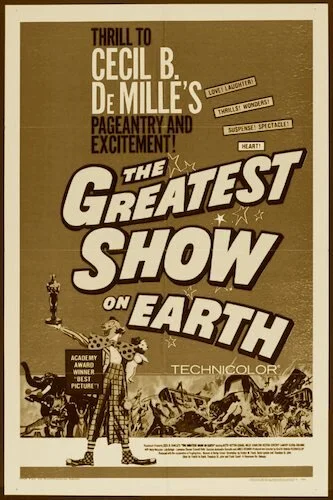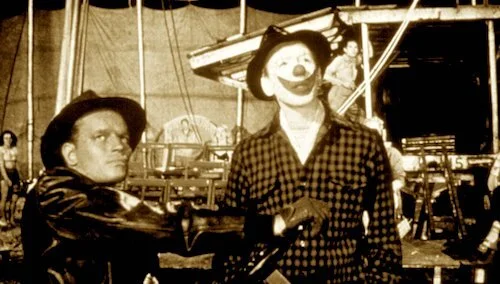The Greatest Show on Earth
This review is a part of the Best Picture Project: a review of every single Academy Award winner for the Best Picture category. The Greatest Show on Earth is the twenty fifth Best Picture winner at the 1952 Academy Awards.
The Greatest Show On Earth.
Spoiler Alert:
It Isn’t.
Andreas Babiolakis has a Masters degree in Film and Photography Preservation and Collections management from Ryerson University, as well as a Bachelors degree in Cinema Studies from York University. His favourite times of year are the Criterion Collection flash sales and the annual Toronto International Film Festival.
Okay, jokes aside, let's call it a day and get this over with. The Greatest Show on Earth would easily be the worst Best Picture winner ever if Cimarron didn't exist. Even still, I almost think this is somehow more upsetting. The Academy should have known better over twenty years into its existence. For crying out loud, they elected Casablanca, All About Eve, and other gems. The Oscars can clearly work sometimes. Cimarron was a winner when they were still figuring it all out: talkies, changing cinematic landscapes, and the Academy itself. Then we get this awful year. The vastly superior High Noon (directed by Fred Zinnemann, who would go on to create two Best Picture winners nonetheless) was pushed aside because of screenwriter Carl Foreman's ties to Communism, thus blacklisting the film from winning Best Picture. It could have been the second western to win, and it would have wiped the slate clean of Cimarron's previous legacy.
Just look at this and tell me this is worthwhile. Go on. I dare you. I double dog dare you. You can’t say it sincerely. You simply cannot.
But, nope. Cecil B. DeMille essentially got one of the first highly notable legacy wins (when an undeserved nomination gets awarded for a previous body of work). DeMille is a legend, but not for this travesty. So, the Academy can avoid gifting a blacklisted film, while honouring a pioneering filmmaker? Sign them up! That’s two birds with one stone! Thus, the biggest mea culpa in Academy history (and that’s saying a lot) took place. The celebration of film should not involve the selection of a severely inferior film, no matter who makes it. It’s like if either Godfather never won, and Francis Ford Coppola won Best Picture for Jack. It’s this bad.
It was clearly meant to be a tribute to DeMille, as can be seen by the other Best Picture nominees not winning. We have Ivanhoe, which was also blacklisted (screenwriter Marguerite Roberts), so let’s ignore that film, since it’s in the same position as High Noon (which won most of its nominations, might I add). So, we have John Huston’s Moulin Rouge (the much better of the two showbiz films), and John Ford’s The Quiet Man (who won Best Director). Every single film is better. Weirdly enough, shouldn’t the award have gone to DeMille in the Director category, if his film did carry enough merit? Or, could you say, they knew which film was supposed to win, and they couldn’t go with it, and so they just called it a day and said “Screw it. We made it twenty five years. Let’s just desecrate the integrity of our own awards!”.
Well, here is a list of the ten worst things about this God awful film, as a reminder that this is in Oscar's canon for life:
1. The toy train and figure props are atrocious: any far-away scene is laughably inauthentic.
2. Then there's the nauseating rear projection, which is beyond dizzying.
3. It's a circus film that features relationship problems. Oh deary me!
4. Charlton Heston's ringleader character permanently looks like his back is itchy and he can't reach the spot.
5. The spectacle moments are boring, so why bother? Isn’t that the primary focus?
6. Way too much unrelated nonsense happens, so the story is terrible too. Refer to 5, and see why this is especially bad.
7. When Heston is trying not to grind his teeth into oblivion, everyone else is annoying, so no one is worthy of you rooting for them
8. There's an acrobatics sequence with a gymnast completing ninety eight rotations (as counted by the circus crowd), and the film cuts away from the one hundredth. Why? Why do this to us? Is our patience not enough? Isn’t avoiding this kind of mistake filmmaking 101? How unsatisfactory can you be?
9. Jimmy Stewart is a fugitive that killed his wife and is hiding as a clown. Yes. Jimmy Stewart. Is a clown. Because he is a fugitive. Running from the law. For committing euthanasia. This is a subplot. Not even the main plot. A subplot. Good. God.
10. It's two and a half freaking hours. All of this, and it’s two and a half hours. Have mercy on me.
The Greatest Show on Earth is pure self-adoring torture, and one of the Academy's biggest blemishes. This film somehow won for its story as well (gee, it could have won any other award, and yet it won the only other award that makes as little amount of sense). I need not say more. If you want to waste your time watching it, be my guest.
Andreas Babiolakis has a Masters degree in Film and Photography Preservation and Collections management from Ryerson University, as well as a Bachelors degree in Cinema Studies from York University. His favourite times of year are the Criterion Collection flash sales and the annual Toronto International Film Festival.






